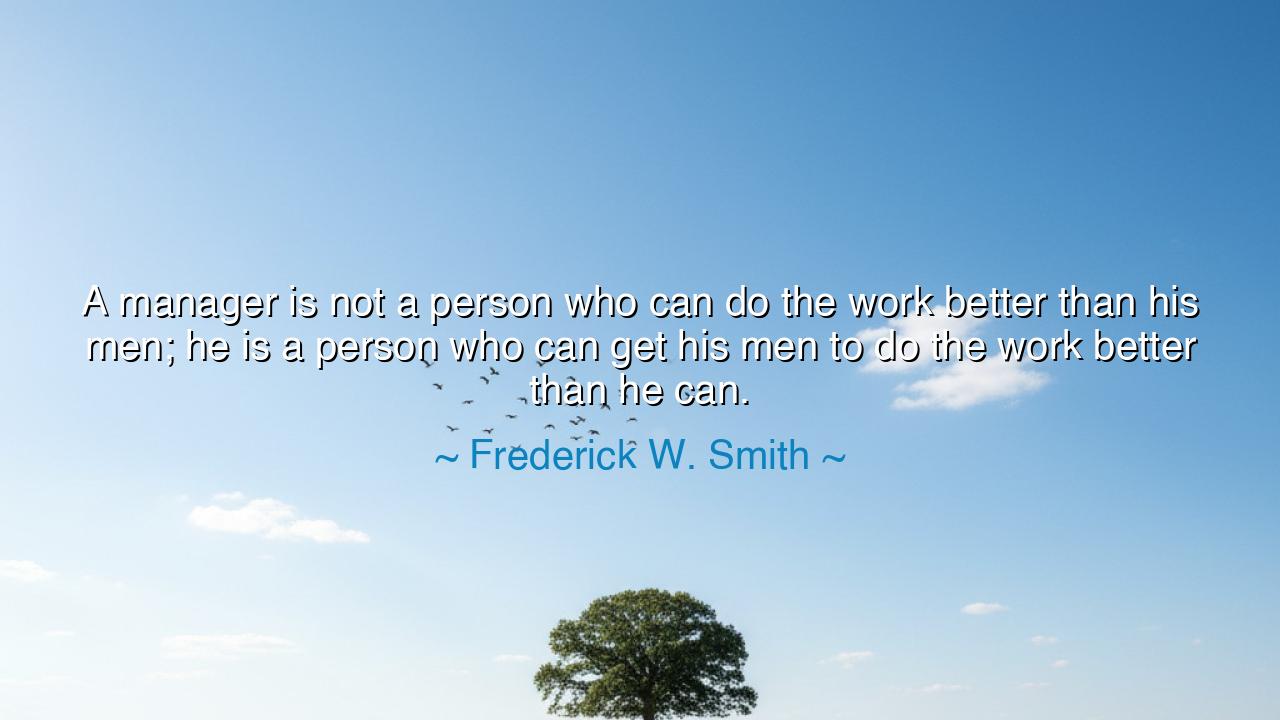
A manager is not a person who can do the work better than his
A manager is not a person who can do the work better than his men; he is a person who can get his men to do the work better than he can.






"A manager is not a person who can do the work better than his men; he is a person who can get his men to do the work better than he can." These profound words by Frederick W. Smith capture the essence of what it truly means to be a leader. In this simple but powerful statement, Smith draws attention to a critical distinction between doing the work and leading others to accomplish it. True leadership is not about mastering every task yourself but about inspiring and guiding those you lead to achieve greater heights than you could ever reach alone. The essence of leadership lies not in personal achievement, but in the empowerment of others to realize their full potential. The greatest managers are not those who do the work themselves but those who can ignite the potential of their team and drive them to excel beyond expectations.
The ancients were deeply aware of the power of leadership and the nature of influence. In Homer’s Iliad, the leaders like Achilles and Odysseus are not always the ones who fight at the frontlines, but the ones who inspire their warriors with bravery, wisdom, and strategy. Achilles, though the greatest warrior, knew when to step back and allow his soldiers to take the forefront, empowering them to fight for something greater than themselves. Similarly, Odysseus, though a skilled warrior, was always strategizing, guiding his men, and using his wit to lead them through impossible situations. In both cases, the strength of the leader was not in doing everything but in empowering the men around them to rise to the occasion. This ancient understanding of leadership transcends time and speaks directly to Smith’s insight.
Consider the example of Alexander the Great, a leader who conquered vast empires, yet never sought to be the best soldier in his army. His genius lay in his ability to inspire those under his command, to create a vision that they were willing to fight and die for. He understood that a successful leader does not need to be the best in every individual skill; rather, a great leader creates an environment where their men outperform themselves, often achieving feats they never thought possible. Alexander’s ability to lead by example, while also delegating authority, allowed his army to be more than just a collection of soldiers. It became a force united by purpose, courage, and loyalty to a shared cause, transcending individual strength or skill.
This concept of empowerment and trust within leadership can be seen in modern business as well. Howard Schultz, the former CEO of Starbucks, understood that his role was not just to run a coffee shop, but to create an environment where his employees felt valued and capable of achieving greatness. He didn’t micromanage every coffee brewed; instead, he instilled a sense of purpose in his baristas, empowering them to deliver excellence in customer service. Under Schultz's leadership, Starbucks became a global phenomenon not because he did the work himself, but because he could inspire his people to bring their best selves to their work every day.
The lesson here is profound: true leadership is not about personal competence, but about the ability to bring out the best in others. As Smith suggests, a manager’s greatest strength is not found in doing the work better than his team but in getting the team to do the work better than anyone thought possible. This wisdom applies not only in the workplace but in all aspects of life. Whether in your family, your community, or your personal endeavors, empower those around you. Encourage them to tap into their potential, to rise above their limitations, and to achieve more than they thought they could.
To apply this wisdom in your own life, begin by asking yourself: How can I elevate those around me? Instead of focusing solely on your own achievements, shift your attention to those who walk beside you. Listen to their ideas, encourage their growth, and create an environment where they can thrive. Acknowledge their strengths and trust them to take ownership of their work, knowing that your success as a leader lies in their ability to exceed expectations. Great managers, like the great leaders of history, understand that their legacy is built not on what they can do alone, but on what their team can accomplish together under their guidance.
Finally, remember that leadership is a lifelong journey of learning and growth. Every interaction is an opportunity to foster empowerment in others, and every challenge is an opportunity to inspire those around you to reach higher and achieve more. As Smith so powerfully reminds us, the essence of leadership is not found in individual brilliance, but in the ability to lead others to brilliance, to make them believe in themselves, and to help them realize their full potential. By doing so, you not only elevate those around you but elevate yourself in the process. The measure of a true leader is not in how much they can do, but in how much they can inspire others to do.






AAdministratorAdministrator
Welcome, honored guests. Please leave a comment, we will respond soon